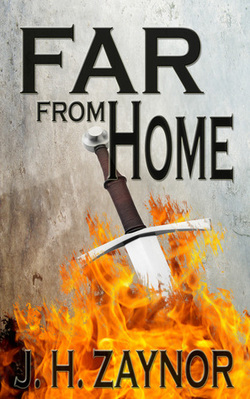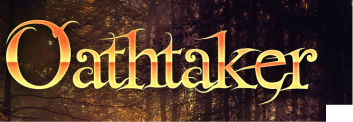
FAR FROM HOME is the story of Mara Cross who is kidnapped by Ethan, her tennis coach, then finds finds herself in another world where her memories of her lost parents give her magic strength to fend off threats. Having read FAR FROM HOME and a number of other stories of late, written by men who fashioned young women as their main characters, I find that I want to swear off such stories—at least for the near future. The reason: with few exceptions, the young women portrayed have been shallow and unbelievable and have left me wanting. For example, Mara thinks Ethan might be a predator when she and her friend, Niki, first meet him at the local sports store because of the way Ethan touches Mara and because of the questions he asks her. Yet, as the story unfolds, Mara believes Ethan’s claims that it is Mara’s own mother who is the evil to be avoided. Notwithstanding the fact that there had been no reason other than Ethan’s word for this, Mara believes him. Back and forth the two go from being the best of friends and helping one another, throwing accusations of falsehood at one another. Of course, Mara’s mother does show up in the story as the harbinger of evil, but not until somewhere quite near the end. In the meantime, why does Mara believe Ethan? I am sorry so say that I never figured out the answer to that question—which left me with the impression that Mara was easily impressionable. Gullible. Foolish.
Here is another example of the lack of depth in Mara’s character: she falls for the handsome Adrian Domville. Everyone warns Mara against Adrian, yet Mara accepts Adrian’s invitations. From that point, Adrian condescends to Mara: “Responsibility to your family is very important, Miss Mara,” he says by way of introduction to “a rather lengthy monologue on duty and honor.” Or: “You should never leave your horse with a stranger,” he tells her, and so on goes the unrequested advice. At one point Adrian completes some instruction to Mara with: “Wouldn’t you agree?” “Oh, yeah,” Mara responded, “not sure of what she was agreeing to.” But, agree she did. Why? Because Adrian was hot. Also, Mara thinks Adrian is going to propose. He has something to ask of her and she is going to say “yes!” Mara thinks to herself: “I’m-going-to-stay-here-forever-and-live-in-this-big-house-and-be-a-fairy-princess.” Not just any fairy princess, mind you: “a professional fairy princess.” Then, when Adrian brings her a gift in a box “four feet long, maybe two feet wide,” Mara realizes that “Okay, it might not be a ring.” Unable to face truth, Mara reasons that the sword Adrian has given her shows that Adrian loves her. Thus, Mara surmises, she should “suck it up and be grateful.” (Hmmmm.) So, it should come as no surprise that when Mara and Adrian go to retrieve an item from the Greigshown, a monster at least seven feet high, Adrian leaves all of the fighting to Mara. Mara obliges—although she thinks all the time that “this is so wrong.” After Adrian watches Mara defeat the beast, Mara inquires “What the HELL were you doing just standing there while that thing was trying to shred me?!!” But, because Adrian tells her she has done a tremendous job, and because Adrian got what he wanted from the beast (notwithstanding Mara’s having been warned against giving that something to Adrian), Mara forgives him. Oh, sure, she was “mad at him nearly the whole way home,” but, no further questions are asked. No—better Mara have the hot guy than use her own sense.
I can fully appreciate that there are young people, men and women, who are short sighted and see only what they want to see. However, it seems the idea of a heroine is that you have a character that is not the ordinary, the mundane, the foolish. The whole concept behind dubbing one a hero is that the character may be regarded as a model or ideal—or at least is one who rises above her faults and shortcomings. Thus it is that Mara is not the model I would have for my teen daughters.
Having said all of that, there are some real bonus points due to this story. Most specifically, the Greigshown was an incredibly well drawn character! His ability to shift from one personality to another, one mode of speech to another, in a heartbeat was very, very well done indeed!
For more information on this author and work, see here.
Here is another example of the lack of depth in Mara’s character: she falls for the handsome Adrian Domville. Everyone warns Mara against Adrian, yet Mara accepts Adrian’s invitations. From that point, Adrian condescends to Mara: “Responsibility to your family is very important, Miss Mara,” he says by way of introduction to “a rather lengthy monologue on duty and honor.” Or: “You should never leave your horse with a stranger,” he tells her, and so on goes the unrequested advice. At one point Adrian completes some instruction to Mara with: “Wouldn’t you agree?” “Oh, yeah,” Mara responded, “not sure of what she was agreeing to.” But, agree she did. Why? Because Adrian was hot. Also, Mara thinks Adrian is going to propose. He has something to ask of her and she is going to say “yes!” Mara thinks to herself: “I’m-going-to-stay-here-forever-and-live-in-this-big-house-and-be-a-fairy-princess.” Not just any fairy princess, mind you: “a professional fairy princess.” Then, when Adrian brings her a gift in a box “four feet long, maybe two feet wide,” Mara realizes that “Okay, it might not be a ring.” Unable to face truth, Mara reasons that the sword Adrian has given her shows that Adrian loves her. Thus, Mara surmises, she should “suck it up and be grateful.” (Hmmmm.) So, it should come as no surprise that when Mara and Adrian go to retrieve an item from the Greigshown, a monster at least seven feet high, Adrian leaves all of the fighting to Mara. Mara obliges—although she thinks all the time that “this is so wrong.” After Adrian watches Mara defeat the beast, Mara inquires “What the HELL were you doing just standing there while that thing was trying to shred me?!!” But, because Adrian tells her she has done a tremendous job, and because Adrian got what he wanted from the beast (notwithstanding Mara’s having been warned against giving that something to Adrian), Mara forgives him. Oh, sure, she was “mad at him nearly the whole way home,” but, no further questions are asked. No—better Mara have the hot guy than use her own sense.
I can fully appreciate that there are young people, men and women, who are short sighted and see only what they want to see. However, it seems the idea of a heroine is that you have a character that is not the ordinary, the mundane, the foolish. The whole concept behind dubbing one a hero is that the character may be regarded as a model or ideal—or at least is one who rises above her faults and shortcomings. Thus it is that Mara is not the model I would have for my teen daughters.
Having said all of that, there are some real bonus points due to this story. Most specifically, the Greigshown was an incredibly well drawn character! His ability to shift from one personality to another, one mode of speech to another, in a heartbeat was very, very well done indeed!
For more information on this author and work, see here.


